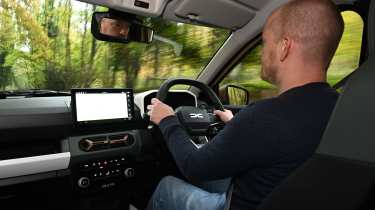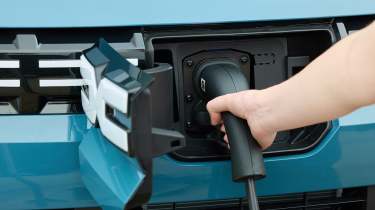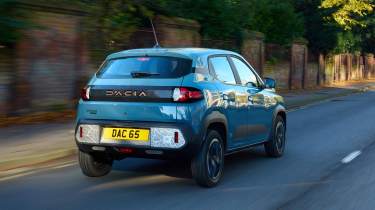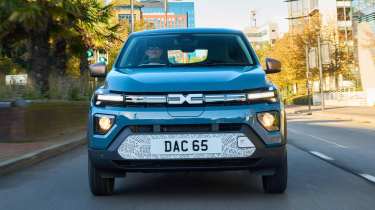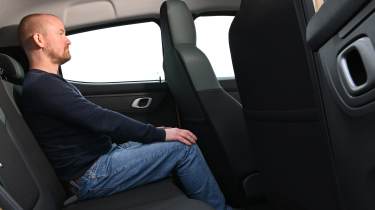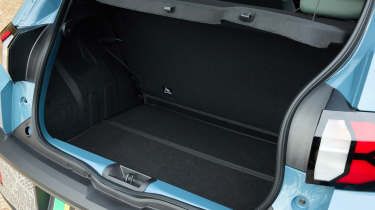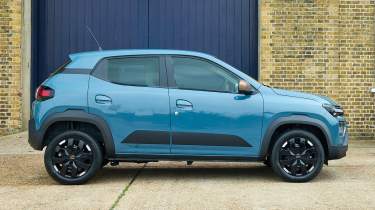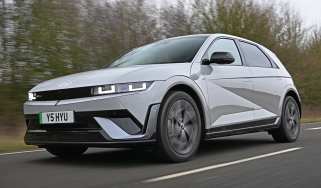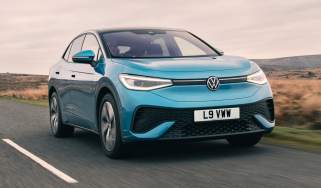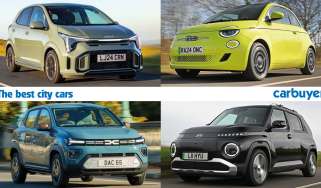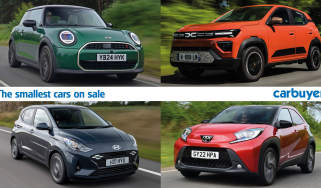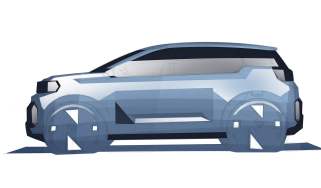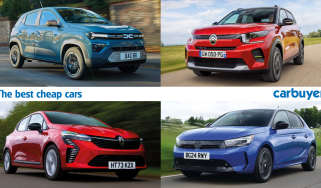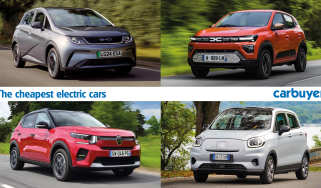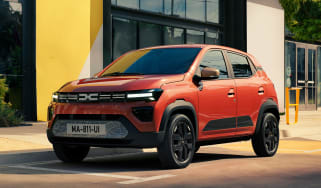Dacia Spring review – Britain’s cheapest new EV
“The Dacia Spring is the UK’s cheapest electric supermini, with a decent driving range and performance but also some compromises in safety and interior quality.”
Pros
- Bargain price
- Efficient and has a reasonable range
- Decent boot
Cons
- Cramped rear seats
- Basic interior quality
- Low safety score
Verdict – is the Dacia Spring a good car?
With a price tag of £15,000, the Dacia Spring appeals to an entirely new group of potential EV buyers and represents the first in a new wave of ultra-affordable small EVs. Along with its tempting price, they’ll no doubt also be impressed with its 140-mile range, a decent boot and 78mph top speed – stats the Citroen Ami can’t get close to. They’ll also have to be prepared to make some compromises, which include a fairly basic interior and minimal safety tech to get it down to that price.
Dacia Spring models, specs and alternatives
While for many years electric cars were considered affordable if they cost below £30,000, fast-forward to 2024 and 2025 and a lot more affordable EV models occupying the £20k price bracket are hitting the market – cars like the Citroen e-C3, Hyundai Inster and Volkswagen ID.2all. Potentially the cheapest of all is this, the Dacia Spring. Remarkably it starts from just below £15,000 for the entry-level version, with the top Extreme trim adding just £2,000. That figure makes it one of the cheapest cars on sale regardless of fuel type, which makes it an even more appealing prospect.
 The 10 cheapest electric cars you can buy today
The 10 cheapest electric cars you can buy today
The Spring is a 3.7-metre-long city car, sitting between the Fiat 500 Electric and MINI Cooper E in terms of size. Given its size and budget billing, its diminutive 27kWh battery shouldn’t be such a big stumbling block for buyers, and its range of around 140 miles also isn’t too bad. The Hyundai Inster promises a 200-mile range, but it’s also quite a bit more expensive to buy. Another advantage of its relatively small battery is that even a home wallbox can fully charge it in just five hours. This is how Dacia expects the majority of owners to top-up their Spring, but the top version also gets 30kW DC charging to speed things up at public charge points. This is rather slow next to the latest EVs, but the small battery pack still keeps a 20-80% top-up down to 45 minutes.
The Spring that’s arriving in the UK is essentially a heavy facelift of the left-hand drive model that’s already been sold to 150,000 customers across Europe. As a result, it gets a more up-to-date interior which feels nicely designed, even if it still uses mostly cheaper plastics and materials to get down to such a bargain price.
The entry-level Expression has a 44bhp electric motor and makes do with a smartphone holder instead of a touchscreen, but still has air-conditioning and cruise control. The Extreme trim gets the more powerful 64bhp motor as standard, and it gets a 10-inch touchscreen with wireless Android Auto/Apple CarPlay and copper accents, so for just under £17,000 or around £180 a month (on a PCP finance deal) we think it makes sense to upgrade.
Given its position below the aforementioned rivals from Fiat and MINI in terms of price, the Dacia Spring should maintain its USP for some time. The Citroen Ami is even cheaper, but it’s classed as a quadricycle with a top speed of just 28mph. In contrast, the BYD Dolphin is larger, with a bigger battery and a higher price tag as a result. Instead, the Spring is likely to find itself on the shopping lists of buyers looking at used EVs like the Peugeot E-208 and Renault ZOE which are a few years old, and may well offer more features and a better range between charges, but won’t have a new car warranty.
| Trim levels | Power options |
|
|
Dacia Spring alternatives
MPG, running costs & CO2 emissions
British buyers can buy the Dacia Spring with two power levels, but both come with the same 27kWh battery pack. This gives the Spring a range of up to 190 miles if you stick to urban driving where the car is likely to spend most of its time.
But, measured to official WLTP standards, the range figure is 140 miles for both the Spring 45 and for the Spring 65 we’ve driven – figures that actually beat the now discontinued Honda e and the 124-mile range of the £28,000 Mazda MX-30. Thanks to the fact the Spring weighs less than one tonne, it’s also pretty efficient, and we found it easy to manage 5.0 miles/kWh during our testing on British roads, for a real-world range of 134 miles. The only caveat is that progress is rather sedate if you try to eke out the car’s maximum range.
A small battery also pays dividends when it comes to charging. A standard 7kW home wallbox should be able to fully charge the Spring in around five hours, and even plugging into a three-pin plug socket is likely to fill the battery if left overnight. The Extreme trim level also adds 30kW DC charging to the Spring, making it capable of a 20-80% charge in around 45 minutes at a public charging station. Not sensationally fast, but quick enough to make the occasional longer journey doable while you take a coffee break. It also supports vehicle-to-grid charging, so you can also use an adaptor to power appliances on a far-flung campsite if you so wish.
Connect the Dacia smartphone app and you can also program the car’s charging times, so it can sip on cheap electricity if you have an EV-friendly overnight tariff. It’s even possible to set the car to warm or cool the cabin ready for your departure time, defrosting the cabin in winter and making it more comfortable in summer – a feature once a pricey option even on high-end luxury cars.
With small tyres and even drum-style rear brakes, the running and even repair costs for the Spring should certainly be minimal. That’s after free VED (road tax) until 2025 and minimal Benefit-in-Kind liability of 2% for company car choosers are taken into account, which should make the Spring one of the UK’s cheapest cars to run.
| Model | Battery size | Range |
| Dacia Spring 45 | 27kWh | 140 miles |
| Dacia Spring 65 | 27kWh | 140 miles |
Insurance
While the Spring’s official insurance groups haven’t been announced yet, we’d hope they’d be just as affordable as the rest of the car, and somewhat lower than the group 17 of the Fiat 500 Electric.
Electric motor, drive & performance
It might have less power than most petrol superminis, but one important thing to remember is that the Spring’s instant torque and single forward gear mean it’s a doddle to drive around town, and its light weight means it can keep up with urban traffic pretty easily.
0-62mph and top speed
The Spring might not be a speed machine, but according to Dacia’s research, it really doesn’t need to be. It’s found that existing Spring owners tend to drive around 23 miles per day at an average speed of just over 20mph. Given this fact, the 13.7-second 0-62mph acceleration figure of the more powerful 64bhp version we’ve tested doesn’t seem so important. Especially when the 0-30mph dash doesn’t feel too sluggish, although performance noticeably drops away as you go faster.
Its 78mph top speed is important, though, because it distinguishes between the Spring and cheap EVs like the Citroen Ami that are technically classed as quadricycles. The latter is limited to just 28mph, essentially restricting their usage to congested city centres and holiday resorts. No such issue with the Spring; while it’s better suited to town use, there’s nothing to stop you from venturing onto a fast A-road, dual-carriageway or motorway when you need to.
Squeeze the throttle pedal and acceleration is smooth and fairly punchy off the line; it can certainly hit the national speed limit with a bit of patience.
Given how affordable the 64bhp motor is, we’d recommend avoiding the 44bhp entry-level version, unless you really do only intend to potter to the shops or you live in the middle of a big city. Taking 19.1 seconds to get from 0-62mph, it will definitely struggle if you head onto faster roads.
There’s also a ‘B’ mode for the motor, and flipping into this setting increases the energy recuperation when you lift off the accelerator. It can feel a bit sharp at first, but it’s easy to get used to the deceleration and avoid using the brake pedal almost entirely around town. This is our preferred way of driving the Spring, because the poor brake feel can make it hard to come to smooth stops.
Higher speeds do expose a weakness of the Spring, though, which is its lack of refinement. Sound deadening has clearly been cut back to save weight and cost, and you’ll need to speak with a loud voice to be heard by your passenger at 60mph. The main issue is wind noise from around the door mirrors, but the electric motor is barely audible and tyre roar is also fairly minimal. Ride comfort is perfectly acceptable, but there’s a bit of bouncing when you tackle a bumpy road surface, and a Hyundai i10 is a bit better at ironing out poor tarmac.
| Model | Power | 0-62mph | Top speed |
| Dacia Spring 45 | 44bhp | 19.1s | 78mph |
| Dacia Spring 65 | 64bhp | 13.7s | 78mph |
Interior & comfort
We weren’t overly impressed by the hard, scratchy plastics and rubber steering wheel of the pre-facelift and left-hand drive Spring we first tried, but the updated car now on sale in the UK has addressed many of our criticisms of the old car.
It’s still no Bentley inside, but materials look better and there are some nice design touches, with highlights like copper accents in the Extreme trim. Sure, it’s still built to a budget, but the design feels more considered and modern than before. An upright driving position and large windows also mean visibility around the car is excellent, which goes hand-in-hand with its sharp turning circle to make manoeuvring a breeze.
Infotainment and navigation
While it might be basic in its interior appointments, that’s not to say the Spring is completely lacking in technology. While the Expression trim makes do with a smartphone holder, the top-spec Spring Extreme we tried is fitted with a modern 10-inch touchscreen infotainment setup providing wireless Apple CarPlay and Android Auto – in fact, it’s shared with the Dacia Duster SUV. This means you should get to enjoy some of your favourite smartphone-style apps and navigation, even in the cheapest EV the UK is likely to see. Everything works pretty well, and you can schedule charging and preconditioning of the cabin via the screen or Dacia’s smartphone app.
Even in the Expression trim, you still get a seven-inch driver’s display, air-conditioning, remote central locking, electric front windows and cruise control. We’d recommend paying £2,000 more for the Extreme though, because along with its other benefits, you also get that central touchscreen, copper trim that lifts the cabin, and vehicle-to-grid charging. The latter essentially means you can use the car’s battery to power external items, and Renault estimates that cooking with an electric grille for an hour will use 13% of the battery
Practicality & boot space
It might be shorter than a MINI Cooper E, but Dacia is big on practicality, so the Spring packs in five doors and a surprisingly generous boot. It’s not perfect, though, because those back doors aren’t especially wide-opening and there’s not lots of back seat space for adults.
Headroom isn’t too bad, but both leg and kneeroom are pretty tight, so only small adults and kids will be happy in the back for longer trips. There are ISOFIX child seat mounting points, but we also suspect bulkier child seats could be a tight squeeze. Dacia also offers ‘YouClip’ accessories that can be attached in various spots around the cabin, from hooks to smartphone holders and cup holders. The Spring boasts no less than 33 litres of storage cubbies around the cabin, and while the white plastic finish of its door bins may not be to all tastes, they do make it easy to find items even in dim lighting.
| Size comparison | |||
| Model | Length | Width | Height |
| Dacia Spring hatchback | 3,734mm | 1,579mm | 1,516mm |
| Fiat 500 Electric hatchback | 3,632mm | 1,683mm | 1,527mm |
| MINI Electric hatchback | 3,845mm | 1,727mm | 1,432mm |
| BYD Dolphin hatchback | 4,209mm | 1,770mm | 1,570mm |
Boot space
Given this, its 308 litres of boot space may come as something of a surprise, and you can pack quite a bit into the Spring’s luggage compartment, and it’s 56 litres more space than you’ll find in a Hyundai i10, despite that car not having to pack in a large battery. Again, there are a few compromises, like the high lip to load items over and the lack of a dedicated space to store charging cables if you need to take them with you. That’s unless you opt for the optional ‘frunk’ storage box under the bonnet that’s part of a Storage Pack costing nearly £300. The boot itself is also a pretty basic space with no hooks for securing items, so it’s a shame the ‘YouClip’ accessories available for the cabin haven’t made it into the storage area.
| Boot space comparison | |
| Model | Boot space |
| Dacia Spring hatchback | 308 litres |
| Fiat 500 Electric hatchback | 185 litres |
| MINI Electric hatchback | 211 litres |
| BYD Dolphin hatchback | 345 litres |
Reliability & safety
Considering the Spring has never been sold in the UK, it’s no surprise there’s no reliability data available just yet. But, given the car's simplicity and relative lack of mechanical parts compared with a combustion-engined supermini, we’d hope any issues would be relatively easy to fix.
Dacia itself didn’t perform too strongly in our 2024 Driver Power satisfaction survey, coming 22nd out of the 32 manufacturers, but this was an improvement of four places over the 2023 result. Around 21% of Dacia owners told us they’d experienced a fault within the first year, and marked down handling, exterior styling and quality. Owners were more impressed with low running costs and value, where the maker came eight and top respectively.
Safety
Perhaps the biggest concern for potential Spring owners will be safety because unless the UK car features an improvement here, the version already crash-tested by Euro NCAP in 2021 achieved just one out of five stars. This included a 49% score for adult occupant protection, 56% for child occupant protection, 39% for vulnerable road users and 32% in safety assist testing.
To meet the latest European safety standards, the facelifted Spring does get autonomous emergency braking that can detect vehicles, pedestrians, cyclists and motorcycles, along with traffic-sign recognition, lane keeping and lane change assist. There’s also driver attention monitoring and an emergency call button, so Dacia will be hoping that despite its low Euro NCAP score, the Spring should still prove safer than the second-hand superminis many buyers will be cross-shopping it against.
There’s also a ‘MyPerso’ menu where you can select the driver-assist functions you want activated and switched off and select them with a physical button. This is especially useful, as they all have to be on each time you start the car by law.
Which Is Best?
Cheapest
- Name27kWh Expression 45 33kW 5dr Auto
- Gearbox typeAuto
- RRP£14,985
Most Economical
- Name27kWh Expression 65 48kW 5dr Auto
- Gearbox typeAuto
- RRP£15,985
Fastest
- Name27kWh Expression 65 48kW 5dr Auto
- Gearbox typeAuto
- RRP£15,985

